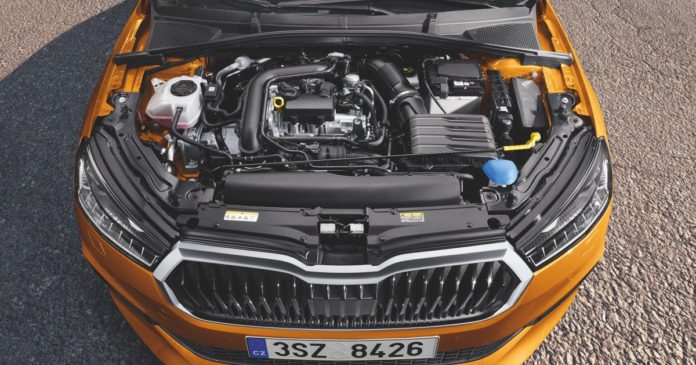While some brands within the Volkswagen Group are abandoning internal combustion within the decade, there’s still life in the old petrol motor yet.
Czech subsidiary Skoda has announced it’s leading the development of the new EA 211 series of internal combustion engines for the entire Volkswagen Group, with the power units to be used across 50 model lines for seven Volkswagen Group brands.
The EA 211 series, which first went into production at Skoda’s Mladá Boleslav facility in 2012, is a modular family of engines that can have three or four cylinders, and range from 1.0 to 1.6 litres in capacity. Currently, these engines cover a “power output spectrum” from 48kW to 115kW.
Further, these units can run on petrol, compressed natural gas (CNG), or ethanol. Mild-hybrid and plug-in hybrid variations are also available.
MPI versions of these engines are naturally aspirated units with indirect multipoint fuel injection. While not sold in Australia, the 1.0 MPI is a common engine in Skoda’s smallest and most affordable models overseas, like the Fabia.
TSI designates turbocharging, and is the group of EA 211 units that would be familiar to a slew of existing VW Group customers in Australia.
The 1.0 TSI and 1.5 TSI petrol engines are used in everything from the Fabia, Kamiq and Scala to the VW Polo and T-Cross in Australia, and are available in larger models like the Golf, Octavia, Tiguan as well as some Audi lines overseas.
The 1.4 TSI used in the Group’s plug-in hybrids – like the Cupra Leon and Formentor VZe variants – are also included in this family.
“Taking responsibility for the development of the entire EA 211 engine series is confirmation of Škoda’s high level of technical expertise,” said Johannes Neft, Skoda board member for technical development.
“At the same time, this underlines the importance of the Škoda brand within the entire Volkswagen Group, as the engines in this series are used in 50 model lines of seven of its brands.”
Previously, Skoda led the development of naturally aspirated MPI versions of the EA 211 series, but has now taken on responsibility of future versions of the turbocharged TSI units as well.
Outside of that, Skoda has also played a pivotal role in developing drum brakes for the entire VW Group, and developed the next-generation Volkswagen Passat alongside its new Superb in Mladá Boleslav.
According to the company’s media release, engineers in Mladá Boleslav will “continue to improve and adapt these engines to the needs and regulations of dozens of global markets”.
“The aim is to develop even more powerful and more fuel-efficient engines with lower emissions, with an emphasis on maximum reliability,” Skoda adds.
While there’s no firm release date for this next iteration of the EA 211 engine family, expect the next generation of VW Group products in the coming 12-18 months to debut the latest versions of these powertrains on a global scale.
As for Australia, the Volkswagen Group hasn’t been able to bring the latest, most efficient versions of these engines at a mass scale – though they have trickled through in specific cases.
For example, the VW Golf offers eTSI variants of the 1.0 TSI and 1.5 TSI turbo petrol engines in other markets with 48V mild-hybrid assistance, as well as two 1.4 TSI plug-in hybrids in the form of the 150kW eHybrid and 180kW GTE, though Australia is stuck with an older 1.4 TSI across the core range.
However, the 1.5 TSI mild-hybrid powertrain has made its way Down Under in the Audi A3 35 TFSI, while the Skoda Kamiq and Scala both offer the non-MHEV 1.5 TSI petrol engine, as does the Audi A1 35 TFSI.
The 1.0 TSI is quite a common unit in the Australian range, offered in the Audi A1, Skoda Kamiq, Volkswagen Polo and T-Cross.
With Australian fuel standards to improve to current European petroleum quality by the end of next year, and emerging legislation around emissions targets in Australia, we could see more of these new powertrains headed to Australia in the next 12-18 months.
The Volkswagen brand, for example, has confirmed its intentions to bring models from its plug-in hybrid range to Australia starting in 2024 – the updated Touareg R, next-gen Tiguan and facelifted Golf GTE are all on the list.
MORE: Glut of fresh product coming to Skoda showrooms in 2024





